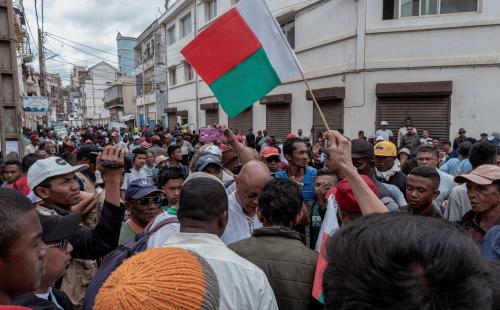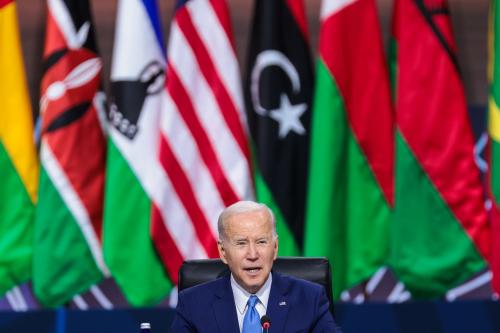United states Africa strategy to focus on increasing investment and countering rising Chinese influence
In a speech in Washington, D.C., on Thursday, National Security Advisor John Bolton presented the White House’s Africa strategy. The strategy is focused on three areas: advancing U.S. trade and commercial ties in Africa, pushing back against Islamic terrorism and violent conflict, and using U.S. aid more “efficiently and effectively to advance peace, stability, independence, and prosperity in the region.”
A key point of emphasis in the strategy is to counter rising Chinese and Russian political and economic influence on the continent. Attacking Chinese engagement in Africa, Bolton noted, “China uses bribes, opaque agreements, and the strategic use of debt to hold states in Africa captive to Beijing’s wishes and demands.” Bolton also attributed the current debt buildup in Zambia and Djibouti to Chinese lending and highlighted the possibility of Chinese state-owned enterprises taking over key infrastructure such as ports and utility companies in those nations. Additionally, Bolton briefly noted the current administration’s intention to pursue new comprehensive bilateral trade agreements with African countries.
To step up U.S. economic engagement in Africa, Bolton announced the creation of a “Prosper Africa” program that will support investment in the region. However, Judd Devermont, director of the Africa Program at the Center for Strategic and International Studies, highlighted that the speech provided few “details on what the ‘Prosper Africa’ approach looks like and how it will be resourced.” Similarly, Landry Signé, a fellow at the Brookings Institution’s Africa Growth Initiative, commented that “the strategy doesn’t seem sufficient to effectively address the United States’ threatened economic, security, and influence interests.”
IMF support for economic reforms and diversification in Angola
The International Monetary Fund (IMF) has approved a $3.7 billion, three-year credit to Angola aimed at supporting the country’s economic reform program. According to the IMF, the credit will support Angola to develop private sector-led economic diversification and restore external and fiscal sustainability. Nearly $1 billion will be made immediately available, while the remainder will be phased in over the duration of the program, subject to semi-annual reviews.
While Angola was once Africa’s largest oil producer, output has declined in recent years, putting a significant strain on an economy, which is heavily reliant on oil exports. Angola’s state-run oil and gas company has increased its efforts to attract foreign investors and expand exploration activities in order to stabilize output, as oil production continues to account for approximately 80 percent of Angola’s government revenue. The government views diversification as an important measure to bolster the economy, however, particularly after the 2014 drop in oil prices.
Angola’s macroeconomic stabilization program focuses on strengthening fiscal sustainability, reducing inflation, promoting a more flexible exchange rate, and improving financial sector sustainability. Structural reforms also aim to diversify the oil-dependent economy to reduce fiscal risks and foster private sector development.
Tensions ignited as DRC elections approach
On Thursday, 10 days ahead of a presidential election in the Democratic Republic of the Congo (DRC) that gained international attention when Joseph Kabila, the current president, announced that he would not run again, a fire destroyed an election commission warehouse in the capital city, Kinshasa.
The warehouse contained thousands of new voting machines, which have been a source of controversy as elections approach, opposition coalitions contesting the upcoming December 23 elections have alleged that the machines are more vulnerable to vote-rigging and could be compromised by the unreliability of the DRC’s power supply. Analysts and activists, including 2018 Nobel Peace Prize winner Denis Mukwege, have warned that if polls are seen as fraudulent the country could face years of protests and conflict.
Authorities have not yet determined the cause of the fire. Both the ruling coalition and lead opposition party have blamed each other for the fire, as well as for inciting other acts of violence. The DRC national electoral commission has said, however, that elections will go forward as scheduled.
Earlier this year, DRC’s incumbent president Joseph Kabila backed his minister of the interior, Emmanuel Ramazani Shadary, to run for president. As Brookings Nonresident Senior Fellow John Muku Mbaku stated, “The announcement was seen as extremely important because it ended many years of uncertainty regarding whether or not Kabila would eventually eliminate presidential term limits and remain in power indefinitely.”



Commentary
Africa in the news: US-Africa strategy, economic reforms in Angola, and elections in DRC
December 15, 2018